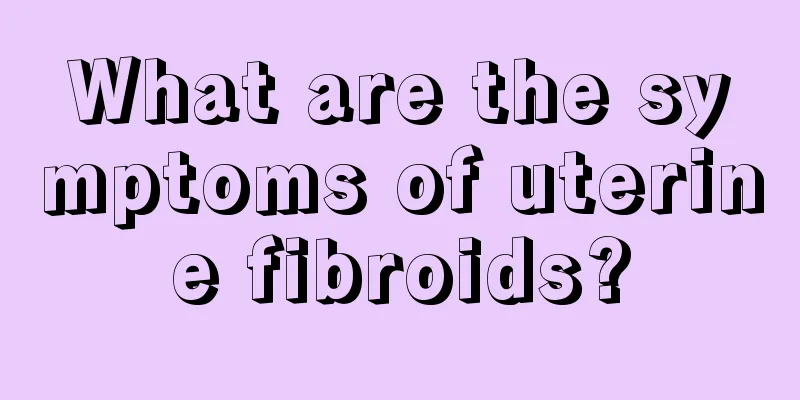What are the symptoms of uterine fibroids?

|
Some women do not know that they are suffering from uterine fibroids when they have many uncomfortable symptoms. The harm caused by uterine fibroids to women is unknown to many women. Let’s start with fertility. If uterine fibroids are not treated well, it will have a great impact on women’s fertility, causing infertility and even turning into cancer. Therefore, it is very important to know the symptoms. So what are the symptoms of uterine fibroids? 1. Increased menstrual bleeding Normal women can accurately calculate the time of their menstruation, which will not be delayed by more than a week. The amount of menstrual blood is also relatively regular, and the amount of blood is not very large every day during the menstrual period. However, if you suffer from uterine fibroids, your menstrual period will be disrupted, and the amount of blood each time will increase significantly, bringing a lot of blood stasis and blood clots in the blood. 2. There is a hard lump in the abdomen Some women find that there is a bulge somewhere on their abdomen when they wake up for breakfast. When they touch it, it feels hard. In the case of this kind of abdominal lump, you must be alert to the possibility of uterine fibroids. 3. Unexplained backache and stomach pain In the few days before the menstrual period, women will feel soreness in the waist and vague pain and discomfort in the stomach. However, if you often feel back pain and stomach pain during your menstrual period, do not exercise regularly or are sick, it may indicate uterine fibroids. 4. Long-term infertility Many couples actively try to get pregnant after marriage, but to no avail. After taking a lot of health supplements and tonics, I found out that it was caused by uterine fibroids. Fibroids can cause obstruction to the fallopian tubes, and a small number of women suffer from infertility for this reason. Symptoms of malignant uterine fibroids Uterine fibroids are divided into benign and malignant. Malignant fibroids are not common, but there is also a 1% chance of malignant change. Pain is the main symptom of malignant uterine fibroids, and most female patients are unable to raise their vigilance. So, what are the symptoms of malignant uterine fibroids? 1. Irregular vaginal bleeding, which may occur at any time, except for those undergoing hormone treatment. If postmenopausal women taking hormone replacement therapy experience vaginal bleeding similar to menstruation, it may indicate uterine cancer. Therefore, if there is any abnormal vaginal bleeding or heavy bleeding, you should go to the hospital for diagnosis and treatment as soon as possible. 2. Vaginal secretions are pink, brown, watery or sticky and have an odor. 3. Pelvic examination revealed an enlarged uterus. 4. Weight loss, weakness, pain in the lower abdomen, back and legs. This happens when cancer metastasizes, or spreads. 5. Infertility and miscarriage are symptoms of malignant uterine fibroids. 30% of patients with uterine fibroids suffer from infertility. Infertility may be the reason for the visit, and uterine fibroids may be discovered during the examination. There are many reasons why uterine fibroids can cause infertility. Please see the special section on uterine fibroids and pregnancy. 6. Anemia. Long-term bleeding without timely treatment may cause anemia. Before liberation, the majority of working women suffered from persistent uterine bleeding due to the pressure of life, but were unable to seek treatment, which caused anemia. A document about uterine fibroid patients in the early days of liberation introduced that 45.25% of the patients had hemoglobin levels between 5 and 10 grams. Those with hemoglobin levels below 5 grams accounted for 12.4%, most of whom were submucosal fibroids. Severe anemia (less than 5 grams) can lead to anemic heart disease and myocardial degeneration. 7. Hypertension. Some patients with malignant uterine fibroids are accompanied by hypertension. Some statistics have shown that most patients with fibroids and hypertension (excluding those with a history of hypertension) return to normal after the fibroids are removed, which may be related to the relief of ureteral compression. When you have uterine fibroids, you must avoid the occurrence of malignant uterine fibroids. If they turn into malignant uterine fibroids, the consequences will be serious and there is a high possibility of cancer. If uterine fibroids cause uterine cancer, the consequences will be even more serious. Such diseases have a particularly great impact on your life, and uterine cancer is also very difficult to control. When you have uterine fibroids, you must seek treatment immediately. |
<<: What are the symptoms of retroflexed uterus?
>>: What are the hazards of gynecological diseases cervicitis
Recommend
Can I sleep with my partner two days before my period?
Menstruation is a physiological characteristic of...
Causes of bloodshot during non-menstrual periods
The symptom of blood streaking during non-menstru...
Don't be obsessed with bananas when you are constipated! This fruit can help you defecate smoothly, it is cheap and delicious
Constipation has long been on the list of urban p...
Does a cold uterus affect a woman’s pregnancy?
Uterine cold is a symptom that has a greater impa...
The probability of test tube babies having Down syndrome
Down syndrome was a common disease in the past, b...
Why do women want to pee when lying down?
Both men and women may experience increased urina...
What are the procedures for fallopian tube recanalization?
What are the types of fallopian tube recanalizati...
How many days does a girl's menstrual period usually last?
Girls' menstruation refers to menstruation, w...
Respiratory tract infections are prevalent. Which pathogens are causing the problem? One article will tell you all!
What is a respiratory infection? Is it the same a...
What causes leucorrhea and stomach pain?
Some friends found that their leucorrhea was stri...
Will postpartum hair loss be severe and will all hair fall out?
Ten months of pregnancy and one day of delivery. ...
Why do we use hot water to stew fish head soup? What are the detailed steps to stew fish head soup?
Fish stew is a very delicious dish. I have eaten ...
Can hemorrhoids be treated during pregnancy?
Hemorrhoids are a particularly common anorectal d...
How to regulate menstruation after a few days
Many people are very concerned about the situatio...









